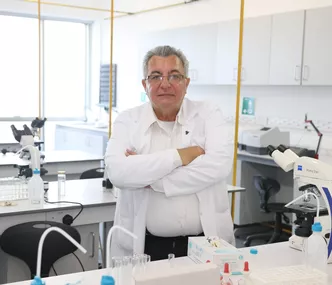
FACULTY OF MEDICINE
News
GAÜ'DEN

GAU FACULTY OF MEDICINE DEAN PROF. ÜNYAYAR INDICATED TO A NEW METHOD FOR THE TREATMENT OF COVID-19 PATIENTS
Girne American University (GAU) Dean of Faculty of Medicine Prof. Ali Ünyayar talked about an effective medicine for COVID-19 patients. Ünyayar said that Interleukin-6 receptor blockers are becoming the new hope for Covid-19.
Prof. Ali Ünyayar made an important statement on the subject, “Since December 2019, a viral pneumonia called coronavirus disease 2019 (COVID-19) from the city of Wuhan, China has swept the world. Although the case fatality rate is not high, the number of infected people is high and still many patients die. With more and more clinical data being collated and published, a large body of data suggests that mild or severe cytokine storms are an important cause of death in severe patients. Therefore, the treatment of cytokine storm has become an important part of saving serious COVID-19 patients. Interleukin-6 (IL-6) plays an important role in cytokine release syndrome. If it is possible to block the signal transduction pathway of IL-6, it is expected to be a new method for the treatment of severe COVID-19 patients. "Tocilizumab is an IL-6 receptor (IL-6R) blocker that can effectively block the IL-6 signal transduction pathway and is therefore likely to become an effective drug for severe COVID-19 patients.”
“A LIFE SAVING DRUG FOR PEOPLE WITH CRITICAL COVID-19”
Ünyayar also said, “Cytokine release syndrome in severe COVID-19: interleukin-6 receptor antagonist tocilizumab may be the key to reducing mortality. Because; Interleukin-6 receptor blockers are starting to show hope for COVID-19 disease, and the World Health Organization (WHO) has updated patient care guidelines, especially when administered with corticosteroids, a class of life-saving drugs for patients who are severely or critically ill with COVID-19, interleukin-6. updated to include receptor blockers. These are findings from a prospective living network meta-analysis initiated by WHO, and it is the largest such analysis of drugs to date. Data from more than 10,000 patients participating in 27 clinical trials were considered. These are the first drugs found to be effective against COVID-19 since corticosteroids were recommended by WHO in September 2020. Patients who are severely or critically ill with COVID-19 often suffer from an overreaction of the immune system that can be very detrimental to the patient's health. "The interleukin-6 blocking drugs - tocilizumab and sarilumab - act to suppress this overreaction.”
Ünyayayar continued, “Forward-looking and living network meta-analyses have shown that administration of these drugs in severe or critically ill patients reduces the probability of death by 13% compared to standard care. This means that there will be 15 fewer deaths per 1,000 patients and 28 fewer deaths per 1,000 critically ill. Mechanical ventilation in severe and critically ill patients
The probability of this is reduced by 28% compared to standard care. That means fewer than 23 out of a thousand patients needing mechanical ventilation. Clinical trial researchers in 28 countries shared data with WHO, including pre-release data. Researchers around the world compiled and analyzed the data. With the support of these critical partnerships, WHO was able to issue a rapid and reliable recommendation for the use of interleukin-6 receptor blockers in severe and critical COVID-19 patients. These drugs offer hope for patients and their families suffering from the devastating impact of the severe and critical COVID-19. But IL-6 receptor blockers are out of reach and not available for purchase for the majority of the world. The inequitable distribution of vaccines means that people in low- and middle-income countries are most susceptible to serious forms of COVID-19. Therefore, the greatest need for these drugs is currently in countries with the least access. We need to change this immediately,” he said.
Ünyayar also said that in order to increase access and affordability for these life-saving products, WHO urged manufacturers to lower prices and provide supplies, especially to low- and middle-income countries where COVID-19 has increased. He also expressed that WHO encourages companies to accept transparent, non-exclusive voluntary licensing agreements or waive their exclusivity rights using the C-TAP platform and the Pharmaceutical Patent Pool.
Noting that WHO has also initiated an expression of interest for the prequalification of manufacturers of interleukin-6 receptor blockers, Ünyayar said, “Prequalification of innovative and biosimilar products aims to expand the availability of quality-assured products and increase access through market competition and lower prices to meet urgent public health needs.”

